In Focus This Week
Real Partnerships, Real Impact
How Researcher-Practitioner Collaboration Is Strengthening U.S. Elections
By Ashley Quarcoo, executive director
The Election Trust Initiative
In the face of new and enduring challenges—from underfunding to security threats to workforce shortages—election officials are constantly looking for ways to maximize their limited resources and bandwidth to best serve their voters. To make sound  decisions in this complex environment—and justify those decisions to policymakers and budget authorities—election officials are eager for actionable insights and trustworthy evidence that can guide their work.
decisions in this complex environment—and justify those decisions to policymakers and budget authorities—election officials are eager for actionable insights and trustworthy evidence that can guide their work.
The good news? Across the country, a powerful trend is emerging: researchers and election officials are building relationships, co-creating shared research agendas, teaming up on projects that identify issues and test interventions, and disseminating findings and guidance to help solve these real-world problems.
Take Contra Costa County, California. Facing stretched outreach budgets, election officials needed to know what kind of messaging would bolster voter trust. Partnering with UC San Diego and UC Davis, they tested real videos and graphics—like the “We Checked it 4 Times” campaign—and used those results to make smarter, more effective outreach decisions for the fast-approaching election cycle. The Contra-Costa study built on prior research and is now feeding a broader body of knowledge around effective voter communication practices.
This isn’t a unique success story. A growing number of authentic, sustained research-practitioner partnerships—ones that are grounded in trust, draw on the expertise of all participants, and address discrete, practical questions—have formed as part of a longer-term effort to build a nonpartisan evidence-base that can drive progress across current and emerging challenges facing the field.
The Big Picture
Too often, research is out of sync with the needs of practitioners. Research can be slow, while practitioner priorities can shift quickly in a changing policy and operating environment. And busy administrators don’t always have time to sift through academic papers for solutions. Without adequate translation of academic findings, the gap between insight and application can loom large for election administrators.
But when researchers and practitioners join forces with intention and urgency to identify discrete areas where research can drive better decisions, they can create useful tools, insights, and strategies that strengthen the system from the ground up.
Why These Partnerships Matter
The best collaborations are more than quick consults—they’re ongoing and sustained relationships where practitioners generate and shape research questions, researchers draw from and add to the overall knowledge base of the field, and together they create results that matter on the ground.
These partnerships help:
- Diagnose system-wide challenges, such as staffing shortages or funding models
- Validate emergent election practices, like multi-media voter education campaigns
- Provide context for and inform policymaking, such as offering comparisons of voter registration and list maintenance practices
- Support the field-wide scaling of best practices, like risk-limiting audits or polling place design
At their best, they help translate findings into usable formats: primers for officials, curriculum guides for training, white papers for lawmakers, and actionable policy recommendations for advocates.
At the heart of it all? Mutual respect, trust, and flexibility.
What This Collaboration Looks Like
Election officials and researchers in several states have successfully forged such partnerships. For example, prior to the 2024 presidential primary, the Maryland State Board of Elections engaged the University of Maryland to help recruit temporary election workers to fill gaps in some counties. Working together, they quickly designed a series of pilot projects that filled key positions while also testing research-driven strategies from other sectors. They successfully met their recruitment goals and studied the effectiveness of applicant-centric messaging and streamlined job ads, without adding pressure or extra work for local jurisdictions.
And in New Mexico, the Secretary of State’s office and county clerks have partnered with the University of New Mexico and Florida State University for nearly two decades on biennial studies that draw on voter registration data, local election observations, and surveys of voters and poll workers to evaluate and inform practice and policy. These studies have provided insights that informed the state-wide transition to vote centers, improvements to poll worker training and staffing assignments, and the expanded use of privacy sleeves for mail-in voting.
Finally, in response to nationwide concerns about long lines at the polls in 2012, the Caltech/MIT Voting Technology Project and the Bipartisan Policy Center partnered with election officials in Florida, Massachusetts, New Mexico, and Virginia to assess wait times and inform decision-making on resource allocation. The resulting insights included information on where and how long wait times arose, assessments of “lost votes” and decreased confidence in elections, and models of best practices used in some localities. The partnership led to the creation of protocols that election officials could use to gather data, diagnose congestion, plan for polling place setup and staffing, and advocate for additional resources to tackle the problem.
This kind of responsive, research-informed policy and practice change is only possible through close, sustained partnership, often enabled by the shared locality of the researchers and election practitioners and amplified by non-profit partners who also support dissemination and implementation of research findings. As these partnerships deepen over time, new research needs and opportunities can organically emerge.
The Election Trust Initiative’s Role in Accelerating Progress
At the Election Trust Initiative, we support and connect the nonpartisan actors that power U.S. elections, including officials, researchers, policymakers, and nonprofits. Our goal is simple: to build a resilient, responsive election system rooted in evidence.
To that end, we are pleased to announce the expansion of our investments in university-practitioner partnerships focused on solving important election administration challenges facing officials across the country. We’ve made these selections intentionally; they represent the richness and diversity of topics and localities that make elections such a unique, multi-disciplinary field.
Long-Term Collaborations
With our support, two universities will establish new initiatives to engage in sustained partnerships with practitioners across the election administration system on critical issues:
- The University of California San Diego’s Center for Transparent and Trusted Elections will tackle voter confidence by testing effective trust-building strategies—from audits to community messengers.
- The University of Maryland’s Election Resilience Lab will address workforce issues and broader challenges to help strengthen the capacity of election agencies.
Targeted, Short-Term Projects
In addition, we are supporting four shorter-term projects to accelerate specific topical and regional partnerships:
- Arkansas State University will examine how election administration varies across the urban-rural spectrum.
- Rutgers University will identify and validate research priorities to improve voting access for people with disabilities.
- The University of Missouri–St. Louis will study how voters and administrators experience vote centers in the increasing number of states that allow them.
- The University of Wisconsin-Madison will examine regional issues, like same-day registration and hyper-local administration, and national studies on poll workers and voter wait times.
And we continue to support MIT’s Election Data and Science Lab, which is translating existing election administration research into digestible field resources to support implementation of evidence-based policies and practices and leading a national consultation on pressing and emergent election administration research needs, such as voter list maintenance practices.
The Road Ahead
These partnerships—and the nonpartisan research they produce—are helping local leaders make smarter decisions today while preparing the system for tomorrow. The Election Trust Initiative is proud to help catalyze these efforts and the collaborations across election officials, non-profits, researchers, and policymakers to apply relevant data and empirical evidence to their work. We hope that these projects, and others like them, inspire and support the entire field, encouraging more researchers to co-design projects with election officials that can surface actionable insights and expanding the number of election officials and other practitioners leveraging research findings and forging new collaborations. Ultimately, these sustained partnerships—anchored in respect, trust, and accountability—can help ensure America’s elections systems are secure, transparent, accurate, and convenient, and effectively serve voters and our country.
Upcoming Schedule Changes
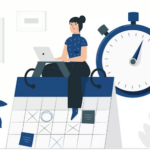 Daily News: From October 3 through October 14 the Daily News will publish each day, however publication times will vary.
Daily News: From October 3 through October 14 the Daily News will publish each day, however publication times will vary.
electionlineWeekly: electionlineWeekly will publish on Thursday, October 9 although most likely not at the 12pm Eastern time when it typically publishes.
electionline Daily News Email
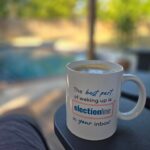 What’s the best part of waking up? electionline Daily News in your inbox of course so be sure to sign up for your daily dose.
What’s the best part of waking up? electionline Daily News in your inbox of course so be sure to sign up for your daily dose.
Each morning you’ll receive the top headlines of the day, plus a listing of states featured in that day’s news round up.
To sign up, simply visit our site and provide us with your email and you’ll begin receiving the news in your inbox each morning.
We Google so you don’t have to!
Election News This Week
 Statewide Audit: Concerns about differences in voting counts between a county and the state in last year’s election prompted the Hawaiʻi Elections Commission to call for statewide audit of the elections. The commission initially voted 9-0 to ask the Legislature to direct the Hawaiʻi Office of the Auditor to audit only Kauaʻi County’s general election. It was based on a recent investigation of the vote that found the state Office of Elections reported a vote count that was significantly higher than the number of ballots recorded by county officials. But the commission, at the recommendation of commissioners Lindsay Kamm and Ralph Cushnie, subsequently moved to expand the scope of the audit to the entire state. Commission Chair Mike Curtis and John Sabas, one of two new commissioners, abstained from the vote. The commission also voted to ask the Legislature to consider returning Hawaiʻi to one-day, in-person voting, and narrowly rejected a proposal to fire the chief election officer, Scott Nago. According to Honolulu Civil Beat, in terms of the requested audit, it’s unclear what comes next. The Legislature, which has authority over the state auditor, is not in session until January. And preparations for the 2026 election, including an Aug. 8 primary, are already underway. But even Nago agreed that it would be better to have the audit conducted by the state auditor rather than have the Office of Elections solicit requests for information and proposals to contract with an outside vendor.
Statewide Audit: Concerns about differences in voting counts between a county and the state in last year’s election prompted the Hawaiʻi Elections Commission to call for statewide audit of the elections. The commission initially voted 9-0 to ask the Legislature to direct the Hawaiʻi Office of the Auditor to audit only Kauaʻi County’s general election. It was based on a recent investigation of the vote that found the state Office of Elections reported a vote count that was significantly higher than the number of ballots recorded by county officials. But the commission, at the recommendation of commissioners Lindsay Kamm and Ralph Cushnie, subsequently moved to expand the scope of the audit to the entire state. Commission Chair Mike Curtis and John Sabas, one of two new commissioners, abstained from the vote. The commission also voted to ask the Legislature to consider returning Hawaiʻi to one-day, in-person voting, and narrowly rejected a proposal to fire the chief election officer, Scott Nago. According to Honolulu Civil Beat, in terms of the requested audit, it’s unclear what comes next. The Legislature, which has authority over the state auditor, is not in session until January. And preparations for the 2026 election, including an Aug. 8 primary, are already underway. But even Nago agreed that it would be better to have the audit conducted by the state auditor rather than have the Office of Elections solicit requests for information and proposals to contract with an outside vendor.
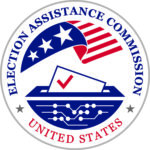 Federal Rulemaking Deadline: On July 16, 2025, the Election Assistance Commission received a petition for rulemaking submitted by America First Legal Foundation, asking the Commission to amend 11 CFR 9428.4 and the federal voter registration form to require documentary proof of United States citizenship to register to vote in federal elections. The National Voter Registration Act (NVRA) of 1993 (52 U.S.C. 20501-20511) created a single federal form that all states are required to accept and use for voter registration for federal elections. The EAC is responsible for maintaining and, as necessary, amending this form. The NVRA mandates that states “accept and use the mail voter registration application form prescribed by the [EAC] . . . for the registration of voters in elections for Federal office”; that the form contain the following question: “Are you a citizen of the United States of America?”; and that the form “include a statement that . . . specifies each eligibility requirement (including citizenship)” and “requires the signature of the applicant, under penalty of perjury.” The NVRA also empowers the EAC to “require . . . information . . . necessary to enable the appropriate State election official to assess the eligibility of the applicant and to administer voter registration and other parts of the election process.” The Help America Vote Act (HAVA) requires that the NVRA form include a question about citizenship status, requiring attestation of United States citizenship under penalty of perjury, without necessitating documentary proof of citizenship (52 U.S.C. 21083(b)(4)(A)). The implementing regulations for this requirement are provided in 11 CFR 9428.4. The petition submitted by America First Legal Foundation seeks to initiate a rulemaking process to amend 11 CFR 9428.4 and the federal voter registration form to require applicants to provide one of the following as proof of citizenship: U.S. Passport, State-issued Real ID-compliant driver’s license indicating that the applicant is a citizen, an official military identification card that indicates the applicant is a citizen of the United States, or a valid Federal or State government-issued photo identification if such identification indicates that the applicant is a United States citizen or if such identification is otherwise accompanied by proof of United States citizenship. The EAC seeks comments on the petition. Deadline: All comments are due by October 20.
Federal Rulemaking Deadline: On July 16, 2025, the Election Assistance Commission received a petition for rulemaking submitted by America First Legal Foundation, asking the Commission to amend 11 CFR 9428.4 and the federal voter registration form to require documentary proof of United States citizenship to register to vote in federal elections. The National Voter Registration Act (NVRA) of 1993 (52 U.S.C. 20501-20511) created a single federal form that all states are required to accept and use for voter registration for federal elections. The EAC is responsible for maintaining and, as necessary, amending this form. The NVRA mandates that states “accept and use the mail voter registration application form prescribed by the [EAC] . . . for the registration of voters in elections for Federal office”; that the form contain the following question: “Are you a citizen of the United States of America?”; and that the form “include a statement that . . . specifies each eligibility requirement (including citizenship)” and “requires the signature of the applicant, under penalty of perjury.” The NVRA also empowers the EAC to “require . . . information . . . necessary to enable the appropriate State election official to assess the eligibility of the applicant and to administer voter registration and other parts of the election process.” The Help America Vote Act (HAVA) requires that the NVRA form include a question about citizenship status, requiring attestation of United States citizenship under penalty of perjury, without necessitating documentary proof of citizenship (52 U.S.C. 21083(b)(4)(A)). The implementing regulations for this requirement are provided in 11 CFR 9428.4. The petition submitted by America First Legal Foundation seeks to initiate a rulemaking process to amend 11 CFR 9428.4 and the federal voter registration form to require applicants to provide one of the following as proof of citizenship: U.S. Passport, State-issued Real ID-compliant driver’s license indicating that the applicant is a citizen, an official military identification card that indicates the applicant is a citizen of the United States, or a valid Federal or State government-issued photo identification if such identification indicates that the applicant is a United States citizen or if such identification is otherwise accompanied by proof of United States citizenship. The EAC seeks comments on the petition. Deadline: All comments are due by October 20.
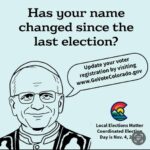 Voter Education/Outreach Efforts: Starting this week, we’re going to highlight some unique, fun, creative, etc. voter education/outreach efforts in hopes of inspiring you as we roll into the Midterms. This week we have a meme from the Chaffee County, Colorado clerk’s office about updating your voter registration, especially for a name change and a social media campaign from the Kitsap County, Washington auditor’s office on ranked choice voting. We’ll be on the lookout, but please feel free to send us any of your new and unique efforts.
Voter Education/Outreach Efforts: Starting this week, we’re going to highlight some unique, fun, creative, etc. voter education/outreach efforts in hopes of inspiring you as we roll into the Midterms. This week we have a meme from the Chaffee County, Colorado clerk’s office about updating your voter registration, especially for a name change and a social media campaign from the Kitsap County, Washington auditor’s office on ranked choice voting. We’ll be on the lookout, but please feel free to send us any of your new and unique efforts.
 Podcast News: High Turnout Wide Margins recently traveled to the 40th annual Election Center conference in Salt Lake City, Utah, and spoke with election administrations and officials from across the county about how they do the work of elections in their communities. In this episode, hosts Eric Fey and Brianna Lennon speak with Gretchen Reinemeyer, the General Registrar/Director of Elections for Arlington County, Virginia. They spoke about some of the challenges that come from running elections in an area that has a large overlap with other metropolitan areas, as well as a large and ever changing number of military voters. On the latest episode of the Democracy Optimist, host Joshua Douglas speaks to Minnesota Secretary of State Steve Simon about the state’s high voter turnout. On the latest episode of Terms of Engagement, hosts Archon Fung and Stephen Richer will explore and debate the boundaries of free speech, threats to it, and the impact on our democracy. For the latest episode of the Election Science Office Hours podcast, R. Michael Alvarez, PhD, Flintridge Foundation Professor of Political and Computational Social Science at Caltech and Co-Director, Linde Center for Science, Society, and Policy speaks with Ben Adida, PhD, Founder and Executive Director of VotingWorks.
Podcast News: High Turnout Wide Margins recently traveled to the 40th annual Election Center conference in Salt Lake City, Utah, and spoke with election administrations and officials from across the county about how they do the work of elections in their communities. In this episode, hosts Eric Fey and Brianna Lennon speak with Gretchen Reinemeyer, the General Registrar/Director of Elections for Arlington County, Virginia. They spoke about some of the challenges that come from running elections in an area that has a large overlap with other metropolitan areas, as well as a large and ever changing number of military voters. On the latest episode of the Democracy Optimist, host Joshua Douglas speaks to Minnesota Secretary of State Steve Simon about the state’s high voter turnout. On the latest episode of Terms of Engagement, hosts Archon Fung and Stephen Richer will explore and debate the boundaries of free speech, threats to it, and the impact on our democracy. For the latest episode of the Election Science Office Hours podcast, R. Michael Alvarez, PhD, Flintridge Foundation Professor of Political and Computational Social Science at Caltech and Co-Director, Linde Center for Science, Society, and Policy speaks with Ben Adida, PhD, Founder and Executive Director of VotingWorks.
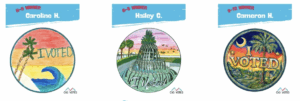 Sticker News: The winners of this year’s Charleston County, South Carolina Elections “I Voted!” sticker design contest were revealed this week. With almost 2,500 votes cast through the official Charleston County Elections Facebook page, three student designs, one from each grade group (K-5, 6-8, and 9-12), were selected as the winners for 2025. The winning artists will each receive prize packs, and the stickers will be found at Charleston County’s five early voting centers during the early voting period for the 2025 municipal elections. Congrats Caroline H., Hailey G., and Cameron H.! The votes
Sticker News: The winners of this year’s Charleston County, South Carolina Elections “I Voted!” sticker design contest were revealed this week. With almost 2,500 votes cast through the official Charleston County Elections Facebook page, three student designs, one from each grade group (K-5, 6-8, and 9-12), were selected as the winners for 2025. The winning artists will each receive prize packs, and the stickers will be found at Charleston County’s five early voting centers during the early voting period for the 2025 municipal elections. Congrats Caroline H., Hailey G., and Cameron H.! The votes 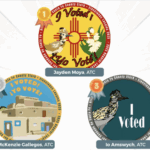 are cast and the results are in – Santa Fe County, New Mexico announced the winners of their 2025 “I Voted” sticker design contest. Community members casted nearly 400 votes with a ranked choice system to decide which three designs will be printed and distributed on stickers during upcoming elections. These designs won: Roadrunner & Yucca by Jayden Moya, Adobe Skyline by McKenzie Gallegos, and Bold Roadrunner by Io Amswych. All three students are from Academy for Technology and the Classics in Santa Fe. The school consists of students in grades 7-12. In all, Santa Fe County received 57 submissions.
are cast and the results are in – Santa Fe County, New Mexico announced the winners of their 2025 “I Voted” sticker design contest. Community members casted nearly 400 votes with a ranked choice system to decide which three designs will be printed and distributed on stickers during upcoming elections. These designs won: Roadrunner & Yucca by Jayden Moya, Adobe Skyline by McKenzie Gallegos, and Bold Roadrunner by Io Amswych. All three students are from Academy for Technology and the Classics in Santa Fe. The school consists of students in grades 7-12. In all, Santa Fe County received 57 submissions.
Personnel News: Former North Carolina Republican Party executive director Dallas Woodhouse will oversee county boards of elections in a new role with the State Auditor’s Office. Princess Lang has been fired by the Board of Voter Registration and Elections of Clarendon County, South Carolina. Joanna Francescut has officially kicked off her campaign for Shasta County, California registrar of voters.
New Research & Resources
 Accessible Forms: The Center for Civic Design has a new step-by-step technical guide to building accessible forms in InDesign. Designing an accessible PDF form requires planning, technical skill, and a solid understanding of accessibility. Many of the elements that make a form usable with assistive technology are hidden “under the hood.” Features like tooltips (the description of the form element that a screen reader announces) and reading order (the sequence in which content is read by assistive technology) are not apparent to sighted users, but they’re essential for accessibility. Building these forms also requires the right tools, such as Adobe InDesign and Acrobat, and clear technical guidance. While there’s plenty of information available on using InDesign and on accessibility in general, there’s little that brings the two together in a resource for making accessible PDF forms in a way that’s easy to follow. We created this new toolkit to fill that gap.
Accessible Forms: The Center for Civic Design has a new step-by-step technical guide to building accessible forms in InDesign. Designing an accessible PDF form requires planning, technical skill, and a solid understanding of accessibility. Many of the elements that make a form usable with assistive technology are hidden “under the hood.” Features like tooltips (the description of the form element that a screen reader announces) and reading order (the sequence in which content is read by assistive technology) are not apparent to sighted users, but they’re essential for accessibility. Building these forms also requires the right tools, such as Adobe InDesign and Acrobat, and clear technical guidance. While there’s plenty of information available on using InDesign and on accessibility in general, there’s little that brings the two together in a resource for making accessible PDF forms in a way that’s easy to follow. We created this new toolkit to fill that gap.
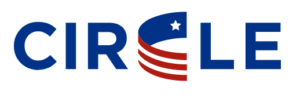 Youth Turnout: The urban-rural gap in youth voter turnout decreased in 2024 compared to the 2020 presidential election, signaling a relative but notable improvement in the voter participation of young people in rural communities. Based on CIRCLE’s analysis of voter file data aggregated by Catalist, 42% of rural youth, ages 18-29, voted in the 2024 presidential election, 5 percentage points lower than the 47% of urban/suburban youth who cast a ballot. In 2020, we estimated that 44% of rural youth, and 52% of urban/suburban youth: an 8-point difference. This shrinking gap is a notable accomplishment for rural youth and for the many organizations and stakeholders that have worked tirelessly to support and encourage their political engagement.
Youth Turnout: The urban-rural gap in youth voter turnout decreased in 2024 compared to the 2020 presidential election, signaling a relative but notable improvement in the voter participation of young people in rural communities. Based on CIRCLE’s analysis of voter file data aggregated by Catalist, 42% of rural youth, ages 18-29, voted in the 2024 presidential election, 5 percentage points lower than the 47% of urban/suburban youth who cast a ballot. In 2020, we estimated that 44% of rural youth, and 52% of urban/suburban youth: an 8-point difference. This shrinking gap is a notable accomplishment for rural youth and for the many organizations and stakeholders that have worked tirelessly to support and encourage their political engagement.
Ballot Measures, Legislation & Rulemaking
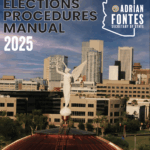 Arizona Rulemaking: Arizona Secretary of State Adrian Fontes has submitted the new rulebook for the 2026 election to Gov. Katie Hobbs and Attorney General Kris Mayes for their review and approval, defying GOP lawmakers who say they will sue over rules they say violate state law. The Election Procedures Manual, which must be revised and approved every two years, has undergone changes after previous Republican lawsuits challenged provisions in it. Some of those changes included deleted examples of what constitutes voter intimidation and deleting a paragraph saying that the secretary of state could finalize the state’s election results without a particular county’s results if the officials missed the state deadline. “Every voter, in every corner of Arizona, should have the same fair and secure election process,” Fontes said in a statement about the submission. “The EPM makes that possible.” The manual also aims to try to alleviate ballot printing errors that have plagued election officials in recent years. Both Hobbs and Mayes must sign off on the EPM by December for it to take effect. The Secretary of State’s Office in a press release Wednesday said that 79 stakeholders submitted nearly 800 comments on the EPM. Some of the public comments include conspiracy theories and a large number of them appear to be copy and pasted from a document created by conservative activist group EZAZ. “This manual reflects bipartisan input, public transparency, and a deep commitment to the rule of law,” Fontes said. “It helps ensure that every Arizonan’s vote is counted accurately and fairly — no matter their zip code.”
Arizona Rulemaking: Arizona Secretary of State Adrian Fontes has submitted the new rulebook for the 2026 election to Gov. Katie Hobbs and Attorney General Kris Mayes for their review and approval, defying GOP lawmakers who say they will sue over rules they say violate state law. The Election Procedures Manual, which must be revised and approved every two years, has undergone changes after previous Republican lawsuits challenged provisions in it. Some of those changes included deleted examples of what constitutes voter intimidation and deleting a paragraph saying that the secretary of state could finalize the state’s election results without a particular county’s results if the officials missed the state deadline. “Every voter, in every corner of Arizona, should have the same fair and secure election process,” Fontes said in a statement about the submission. “The EPM makes that possible.” The manual also aims to try to alleviate ballot printing errors that have plagued election officials in recent years. Both Hobbs and Mayes must sign off on the EPM by December for it to take effect. The Secretary of State’s Office in a press release Wednesday said that 79 stakeholders submitted nearly 800 comments on the EPM. Some of the public comments include conspiracy theories and a large number of them appear to be copy and pasted from a document created by conservative activist group EZAZ. “This manual reflects bipartisan input, public transparency, and a deep commitment to the rule of law,” Fontes said. “It helps ensure that every Arizonan’s vote is counted accurately and fairly — no matter their zip code.”
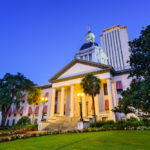 Florida: A bill (HB 73) that would establish a centralized database to track the voting-rights status of individuals with felony convictions has once again been filed in the Florida House of Representatives. Rep. Felicia Robinson, D-Miami Gardens, has sponsored similar legislation over the past several sessions. None have received a committee hearing (Broward County Democrat Tina Polsky has filed similar legislation in the Senate in previous years). Robinson’s legislation calls for the Florida Commission on Offender Review to develop and maintain a database of information for those with felony convictions including: The remaining length of any term of supervision. The remaining amount of any restitution owed to a victim as ordered by a court as part of his or her sentence. The remaining amount due of any fines and fees initially ordered by a court as part of his or her sentence or as a condition of any form of supervision. If the measure were to become law, the Department of State, the Department of Corrections, the clerks of the circuit courts, the county comptrollers, and the Board of Executive Clemency would provide the information listed above to the commission. That body would be required to provide the governor, president of the Senate, and speaker of the House a comprehensive plan by July 1, 2027, that would: List government entities and methods by which the commission would collect, centralize, analyze, and secure the information required to be included in the database. Describe any infrastructure and services, including but not limited to, software, hardware, and information technology services, that may be necessary to create and maintain the database. List the anticipated number of additional employees to develop and maintain the database. Estimate the cost of the database. Cite any legal authority necessary for the commission to develop and maintain the database.
Florida: A bill (HB 73) that would establish a centralized database to track the voting-rights status of individuals with felony convictions has once again been filed in the Florida House of Representatives. Rep. Felicia Robinson, D-Miami Gardens, has sponsored similar legislation over the past several sessions. None have received a committee hearing (Broward County Democrat Tina Polsky has filed similar legislation in the Senate in previous years). Robinson’s legislation calls for the Florida Commission on Offender Review to develop and maintain a database of information for those with felony convictions including: The remaining length of any term of supervision. The remaining amount of any restitution owed to a victim as ordered by a court as part of his or her sentence. The remaining amount due of any fines and fees initially ordered by a court as part of his or her sentence or as a condition of any form of supervision. If the measure were to become law, the Department of State, the Department of Corrections, the clerks of the circuit courts, the county comptrollers, and the Board of Executive Clemency would provide the information listed above to the commission. That body would be required to provide the governor, president of the Senate, and speaker of the House a comprehensive plan by July 1, 2027, that would: List government entities and methods by which the commission would collect, centralize, analyze, and secure the information required to be included in the database. Describe any infrastructure and services, including but not limited to, software, hardware, and information technology services, that may be necessary to create and maintain the database. List the anticipated number of additional employees to develop and maintain the database. Estimate the cost of the database. Cite any legal authority necessary for the commission to develop and maintain the database.
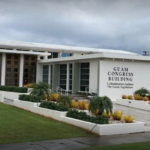 Guam: A public hearing was held September 26 on Bill 190-38 by Sen. Telo Taitague which proposes to adopt the updated Guam election manual. Guam Election Commission executive director Maria Pangelinan was the lone person to testify. She said the election manual, originally created in 2015, has been reviewed and updated to strengthen and clarify the administration of the electoral process. “The proposed legislation ensures that GEC has ample time to implement these updates in its training materials as it prepares for the 2026 elections,” Pangelinan said. The election commission members met in April and proposed several changes to provisions in the more than 70-page manual. They were sent to the governor’s office and the Office of the Attorney General, and subsequently approved. Pangelinan testified about the proposed amendments, most of which were technical in nature, such as extending various deadlines. For example, the GEC sought to change the last day to register to vote from 15 days to 10 days before an election to give prospective voters an extra five days, and would also make it consistent with the election code.
Guam: A public hearing was held September 26 on Bill 190-38 by Sen. Telo Taitague which proposes to adopt the updated Guam election manual. Guam Election Commission executive director Maria Pangelinan was the lone person to testify. She said the election manual, originally created in 2015, has been reviewed and updated to strengthen and clarify the administration of the electoral process. “The proposed legislation ensures that GEC has ample time to implement these updates in its training materials as it prepares for the 2026 elections,” Pangelinan said. The election commission members met in April and proposed several changes to provisions in the more than 70-page manual. They were sent to the governor’s office and the Office of the Attorney General, and subsequently approved. Pangelinan testified about the proposed amendments, most of which were technical in nature, such as extending various deadlines. For example, the GEC sought to change the last day to register to vote from 15 days to 10 days before an election to give prospective voters an extra five days, and would also make it consistent with the election code.
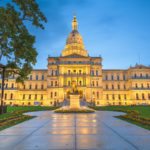 Michigan: A proposed bill from House Republicans would make Michigan’s school board candidates declare a party affiliation, a change that’s drawing criticism from local election officials and school board members. Under state law, school board positions are explicitly nonpartisan. House Bill 4588, introduced by Rep. Jason Woolford, would tweak the law to require candidates for local school boards to declare a party affiliation. That requirement could force the races to have primary elections in August, in addition to the November general election when school board seats are typically voted on, officials said. Michigan clerks warn that the bill could create a range of problems for local election offices, including longer ballots, voter confusion, and thousands of extra dollars in expenses. For one thing, it would require changing the layout of primary ballots to include school board candidates in the partisan section, which could be confusing for voters and expensive to implement, Hillsdale County Clerk Abe Dane told Votebeat.
Michigan: A proposed bill from House Republicans would make Michigan’s school board candidates declare a party affiliation, a change that’s drawing criticism from local election officials and school board members. Under state law, school board positions are explicitly nonpartisan. House Bill 4588, introduced by Rep. Jason Woolford, would tweak the law to require candidates for local school boards to declare a party affiliation. That requirement could force the races to have primary elections in August, in addition to the November general election when school board seats are typically voted on, officials said. Michigan clerks warn that the bill could create a range of problems for local election offices, including longer ballots, voter confusion, and thousands of extra dollars in expenses. For one thing, it would require changing the layout of primary ballots to include school board candidates in the partisan section, which could be confusing for voters and expensive to implement, Hillsdale County Clerk Abe Dane told Votebeat.
Legal Updates
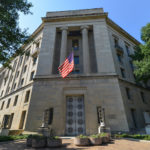 U.S. Department of Justice: The U.S. Department of Justice announced September 25 it is suing six states — California, Michigan, Minnesota, New Hampshire, New York, and Pennsylvania — that have refused to turn over detailed voter roll data demanded by federal attorneys earlier this year. The Justice Department has reached out to more than half the states in recent months for voter lists, and has indicated it plans to contact all of them. Some of the requests vary in detail, but in general they ask for voter information on millions of Americans, including personal data such as driver’s license numbers and partial Social Security numbers. Some states have released only publicly available data or invited DOJ attorneys to make public records requests. Others have refused outright. Indiana last week became the first known state to have provided sensitive personal data. The lawsuits have been filed in the federal districts of the respective states. They argue that the federal government is privy to the data under two federal laws, the Help Americans Vote Act (HAVA) and the National Voter Registration Act (NVRA), that were passed “to ensure that states have proper and effective voter registration and voter list maintenance programs,” the Justice Department said in a news release. “Clean voter rolls are the foundation of free and fair elections,” said U.S. Attorney General Pam Bondi in a statement announcing the lawsuits. “Every state has a responsibility to ensure that voter registration records are accurate, accessible, and secure — states that don’t fulfill that obligation will see this Department of Justice in court.” This is in addition to suits it had already filed against Maine and Oregon.
U.S. Department of Justice: The U.S. Department of Justice announced September 25 it is suing six states — California, Michigan, Minnesota, New Hampshire, New York, and Pennsylvania — that have refused to turn over detailed voter roll data demanded by federal attorneys earlier this year. The Justice Department has reached out to more than half the states in recent months for voter lists, and has indicated it plans to contact all of them. Some of the requests vary in detail, but in general they ask for voter information on millions of Americans, including personal data such as driver’s license numbers and partial Social Security numbers. Some states have released only publicly available data or invited DOJ attorneys to make public records requests. Others have refused outright. Indiana last week became the first known state to have provided sensitive personal data. The lawsuits have been filed in the federal districts of the respective states. They argue that the federal government is privy to the data under two federal laws, the Help Americans Vote Act (HAVA) and the National Voter Registration Act (NVRA), that were passed “to ensure that states have proper and effective voter registration and voter list maintenance programs,” the Justice Department said in a news release. “Clean voter rolls are the foundation of free and fair elections,” said U.S. Attorney General Pam Bondi in a statement announcing the lawsuits. “Every state has a responsibility to ensure that voter registration records are accurate, accessible, and secure — states that don’t fulfill that obligation will see this Department of Justice in court.” This is in addition to suits it had already filed against Maine and Oregon.
 Federal Lawsuits: A class action federal lawsuit filed this week argues the Trump administration’s actions that aggregated personal data on hundreds of millions of Americans from various federal agencies violated federal privacy laws and the U.S. Constitution, put sensitive data at risk of security breaches, and could lead to the disenfranchisement of eligible voters. The suit argues that the Department of Homeland Security, along with the Department of Government Efficiency team, is “working rapidly to create precisely the type of ‘national data banks’ the American people and Congress have consistently resisted, and the Privacy Act was designed to prevent.” The suit was filed in federal court in Washington, D.C., on behalf of the League of Women Voters, the Electronic Privacy Information Center and five unnamed U.S. citizens.
Federal Lawsuits: A class action federal lawsuit filed this week argues the Trump administration’s actions that aggregated personal data on hundreds of millions of Americans from various federal agencies violated federal privacy laws and the U.S. Constitution, put sensitive data at risk of security breaches, and could lead to the disenfranchisement of eligible voters. The suit argues that the Department of Homeland Security, along with the Department of Government Efficiency team, is “working rapidly to create precisely the type of ‘national data banks’ the American people and Congress have consistently resisted, and the Privacy Act was designed to prevent.” The suit was filed in federal court in Washington, D.C., on behalf of the League of Women Voters, the Electronic Privacy Information Center and five unnamed U.S. citizens.
U.S. District Judge Jeffrey Bryan ruled late last week that MyPillow founder Mike Lindell defamed the election technology company Smartmatic with false statements that its voting machines helped rig the 2020 presidential election. Bryan deferred until future proceedings the question of whether Lindell — one of the country’s most prominent propagators of false claims that the 2020 election was a fraud — acted with the “actual malice” that Smartmatic still needs to prove to collect any damages. The judge said there are “genuine fact disputes” as to whether Lindell’s statements were made “with knowledge that they were false or made with reckless disregard to their falsity.” He noted that the defense says Lindell has an “unwavering belief” that his statements were truthful. The statements cited by the judge arose from Lindell’s criticism of the results of the 2020 election in Los Angeles County. The judge ruled there were 51 specific times when Lindell falsely claimed — in documentaries he produced and through various media and personal appearances — that Smartmatic interfered with the results. “The Court concludes that, based on the record presented, no reasonable trier of fact could find that any of the statements at issue are true,” Bryan wrote.
Rudy Giuliani has reached a settlement with Dominion Voting Systems in its $1.3 billion defamation lawsuit over his baseless 2020 election-rigging claims. The two sides said in a filing in federal court in Washington, D.C., on September 26 that they have agreed to permanently dismiss the suit against the former New York City mayor and former personal lawyer to President Trump. The brief filing doesn’t cite the settlement terms. Spokespeople for Giuliani and the Colorado-based Dominion said that the terms are confidential and declined to comment further. “The Parties have agreed to a confidential settlement to this matter,” a Dominion spokesperson told CBS News in a statement. Dominion sued Giuliani in 2021 for $1.3 billion in damages after he led Mr. Trump’s efforts to cast doubt on the 2020 election results.
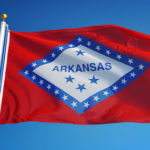 Arkansas: Chief Judge Timothy Brooks of the U.S. District Court for the Western District of Arkansas delayed ruling this week in a case challenging new state laws that plaintiffs argue violate the First Amendment and hinder their ability to collect signatures for citizen-initiated ballot measures. The original suit was brought by ballot committee Save AR Democracy and the League of Women Voters of Arkansas, which is in the process of gathering signatures for a 2026 ballot initiative. League President Bonnie Miller and Benton County chapter President Danielle Quesnell are also plaintiffs. Two other ballot question groups, Protect AR Rights and For AR Kids, joined as intervenor-plaintiffs in July. Arkansas Secretary of State Cole Jester and Arkansas Attorney General Tim Griffin are defendants. The plaintiffs say the laws are intended to stifle direct democracy, a process by which Arkansans can propose new laws or constitutional amendments and place them on the ballot for a statewide vote. They asked Brooks to issue a temporary restraining order and preliminary injunction against six of the laws they are challenging while the lawsuit is ongoing. Brooks’ delay means the 2025 laws, now in effect, will continue to apply.
Arkansas: Chief Judge Timothy Brooks of the U.S. District Court for the Western District of Arkansas delayed ruling this week in a case challenging new state laws that plaintiffs argue violate the First Amendment and hinder their ability to collect signatures for citizen-initiated ballot measures. The original suit was brought by ballot committee Save AR Democracy and the League of Women Voters of Arkansas, which is in the process of gathering signatures for a 2026 ballot initiative. League President Bonnie Miller and Benton County chapter President Danielle Quesnell are also plaintiffs. Two other ballot question groups, Protect AR Rights and For AR Kids, joined as intervenor-plaintiffs in July. Arkansas Secretary of State Cole Jester and Arkansas Attorney General Tim Griffin are defendants. The plaintiffs say the laws are intended to stifle direct democracy, a process by which Arkansans can propose new laws or constitutional amendments and place them on the ballot for a statewide vote. They asked Brooks to issue a temporary restraining order and preliminary injunction against six of the laws they are challenging while the lawsuit is ongoing. Brooks’ delay means the 2025 laws, now in effect, will continue to apply.
 Colorado: Virginia Chau, a lawyer who worked part-time as a polling center supervisor during elections in Denver who says she lost her job after speaking to comedian Jon Stewart about her concerns for the safety of poll workers has settled a lawsuit alleging the city violated her First Amendment rights for $65,000, her lawyer said. Chau spoke in 2022 about threats made against election workers and the lack of training for them during a panel discussion on the short-lived streaming show “The Problem with Jon Stewart” in 2022. Denver paid Chau $65,000 under the settlement agreement, her lawyer, David Lane, said. A copy of the Sept. 2 deal said Denver denied any wrongdoing against Chau. Representatives for the city attorney’s office and the clerk and recorder’s office, which runs elections, did not immediately respond to emails and telephone calls requesting comment. Chau alleged she was removed as a supervisor because of her comments on the show and told she could be a voting hotline representative instead because no one from the public would recognize her in that job. She considered it a demotion and did not accept the new assignment. Chau earned about $10,000 a year working on elections, doing the job mostly because, as an immigrant, she felt privileged to live in a democracy, Lane said. He said the loss of her job was devastating. Chau’s lawsuit said she had a right to speak about a matter of public importance as a private citizen under the First Amendment. According to court documents, Denver said Chau was speaking as a government employee about her job and that it did not violate her free speech rights. The city denied she was terminated or demoted, just reassigned.
Colorado: Virginia Chau, a lawyer who worked part-time as a polling center supervisor during elections in Denver who says she lost her job after speaking to comedian Jon Stewart about her concerns for the safety of poll workers has settled a lawsuit alleging the city violated her First Amendment rights for $65,000, her lawyer said. Chau spoke in 2022 about threats made against election workers and the lack of training for them during a panel discussion on the short-lived streaming show “The Problem with Jon Stewart” in 2022. Denver paid Chau $65,000 under the settlement agreement, her lawyer, David Lane, said. A copy of the Sept. 2 deal said Denver denied any wrongdoing against Chau. Representatives for the city attorney’s office and the clerk and recorder’s office, which runs elections, did not immediately respond to emails and telephone calls requesting comment. Chau alleged she was removed as a supervisor because of her comments on the show and told she could be a voting hotline representative instead because no one from the public would recognize her in that job. She considered it a demotion and did not accept the new assignment. Chau earned about $10,000 a year working on elections, doing the job mostly because, as an immigrant, she felt privileged to live in a democracy, Lane said. He said the loss of her job was devastating. Chau’s lawsuit said she had a right to speak about a matter of public importance as a private citizen under the First Amendment. According to court documents, Denver said Chau was speaking as a government employee about her job and that it did not violate her free speech rights. The city denied she was terminated or demoted, just reassigned.
 New Hampshire: Last week, the U.S. Department of Justice sued New Hampshire Secretary of State Dave Scanlan to compel him to turn over the state’s voter registration file, which contains every voter’s name, address, voting history, and party affiliation. State officials have not yet responded to the lawsuit. But Neal Kurk and three other New Hampshire residents are seeking to insert themselves into the lawsuit, arguing they have an interest in its outcome as registered voters concerned about their privacy. In a court motion filed September 30, Kurk, Portsmouth Attorney Christopher Cole, former Democratic state representative Bob Perry, and liberal activist Louise Spencer have asked to intervene in the litigation, which would allow the group to file its own motions asking the judge to strike down the lawsuit. “DOJ’s demands not only run roughshod over federalism principles and New Hampshire law — they spurn Proposed Intervenors’ privacy rights,” the motion, brought by Steven Dutton of McLane Middleton, attorney Paul Twomey, and the Elias Law Group reads. Late September 30, U.S Magistrate Judge Andrea Johnston granted a request by the federal government to pause the lawsuit until the end of the federal government shutdown; the case is expected to eventually resume.
New Hampshire: Last week, the U.S. Department of Justice sued New Hampshire Secretary of State Dave Scanlan to compel him to turn over the state’s voter registration file, which contains every voter’s name, address, voting history, and party affiliation. State officials have not yet responded to the lawsuit. But Neal Kurk and three other New Hampshire residents are seeking to insert themselves into the lawsuit, arguing they have an interest in its outcome as registered voters concerned about their privacy. In a court motion filed September 30, Kurk, Portsmouth Attorney Christopher Cole, former Democratic state representative Bob Perry, and liberal activist Louise Spencer have asked to intervene in the litigation, which would allow the group to file its own motions asking the judge to strike down the lawsuit. “DOJ’s demands not only run roughshod over federalism principles and New Hampshire law — they spurn Proposed Intervenors’ privacy rights,” the motion, brought by Steven Dutton of McLane Middleton, attorney Paul Twomey, and the Elias Law Group reads. Late September 30, U.S Magistrate Judge Andrea Johnston granted a request by the federal government to pause the lawsuit until the end of the federal government shutdown; the case is expected to eventually resume.
 Pennsylvania: County election officials are required to accurately report when voters’ mail-in ballots have been set aside because of disqualifying errors and allow their votes to be counted on provisional ballots, Pennsylvania’s highest court ruled. The state Supreme Court’s 4-3 decision upholds lower court rulings that Washington County election officials violated voters’ rights by misleading them about the status of their mail-in ballots. This prevented voters from challenging the board’s decision to disqualify 259 vote-by-mail ballots or casting provisional ballots as a backup to ensure their votes were counted, the courts said. “We must interpret the Election Code and its statutory procedures in a way that ‘favors the fundamental right to vote and enfranchises, rather than disenfranchises, the electorate,’” Justice Kevin Dougherty wrote for the majority, quoting the court’s 2020 decision resolving issues surrounding the then-new vote-by-mail law. “Reading the Code as allowing county boards to withhold readily available information from voters does not serve that goal,” Dougherty wrote.
Pennsylvania: County election officials are required to accurately report when voters’ mail-in ballots have been set aside because of disqualifying errors and allow their votes to be counted on provisional ballots, Pennsylvania’s highest court ruled. The state Supreme Court’s 4-3 decision upholds lower court rulings that Washington County election officials violated voters’ rights by misleading them about the status of their mail-in ballots. This prevented voters from challenging the board’s decision to disqualify 259 vote-by-mail ballots or casting provisional ballots as a backup to ensure their votes were counted, the courts said. “We must interpret the Election Code and its statutory procedures in a way that ‘favors the fundamental right to vote and enfranchises, rather than disenfranchises, the electorate,’” Justice Kevin Dougherty wrote for the majority, quoting the court’s 2020 decision resolving issues surrounding the then-new vote-by-mail law. “Reading the Code as allowing county boards to withhold readily available information from voters does not serve that goal,” Dougherty wrote.
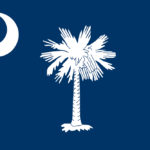 South Carolina: Circuit Court Judge Daniel Coble refused to temporarily block the South Carolina Election Commission from sharing information with the Department of Justice. Coble’s ruling doesn’t mean the transfer is imminent. State and federal officials are still working out the details for security safeguards and how the data will be transmitted, according to the agency. In his conclusion, Coble noted he has “grave concerns about federal overreach and encroachment over this State’s sovereignty.” However, he wrote, that’s not the issue at hand. He laid out several reasons for denying the motion to temporarily block the release of data. First, he said, Calhoun County voter Anne Crook has failed to prove she’ll suffer harm without an injunction. Her motion sought to block any exchange of data until there’s a memorandum of understanding between the election agency and U.S. Department of Justice. “Federal law likely preempts state law in this area,” Coble wrote in his conclusion. “The State at this point has interpreted the law as requiring compliance.” He postponed deciding on Gov. Henry McMaster’s request to dismiss the case.
South Carolina: Circuit Court Judge Daniel Coble refused to temporarily block the South Carolina Election Commission from sharing information with the Department of Justice. Coble’s ruling doesn’t mean the transfer is imminent. State and federal officials are still working out the details for security safeguards and how the data will be transmitted, according to the agency. In his conclusion, Coble noted he has “grave concerns about federal overreach and encroachment over this State’s sovereignty.” However, he wrote, that’s not the issue at hand. He laid out several reasons for denying the motion to temporarily block the release of data. First, he said, Calhoun County voter Anne Crook has failed to prove she’ll suffer harm without an injunction. Her motion sought to block any exchange of data until there’s a memorandum of understanding between the election agency and U.S. Department of Justice. “Federal law likely preempts state law in this area,” Coble wrote in his conclusion. “The State at this point has interpreted the law as requiring compliance.” He postponed deciding on Gov. Henry McMaster’s request to dismiss the case.
 Texas: Judge Megan Fahey is expected to decide whether to grant a temporary injunction against Tarrant County’s new commissioner precincts next week. It’s part of a lawsuit filed by the League of Women Voters of Tarrant County and the League of United Latin American Citizens Fort Worth Council 4568. The lawsuit alleges the county’s mid-decade redistricting is unconstitutional, naming Tarrant County, the commissioners court and County Judge Tim O’Hare as defendants. Fahey heard arguments and testimony in the 348th District Court in the request for an injunction filed by the two groups. The request comes as the two organizations work with the Texas Voting Rights Coalition in an attempt to stop the voting maps, which opponents have described as racist and a power grab. Attorneys for the plaintiffs argued that the map is not legally valid because it focuses on population and partisanship without consideration for other state constitutional requirements for redistricting.
Texas: Judge Megan Fahey is expected to decide whether to grant a temporary injunction against Tarrant County’s new commissioner precincts next week. It’s part of a lawsuit filed by the League of Women Voters of Tarrant County and the League of United Latin American Citizens Fort Worth Council 4568. The lawsuit alleges the county’s mid-decade redistricting is unconstitutional, naming Tarrant County, the commissioners court and County Judge Tim O’Hare as defendants. Fahey heard arguments and testimony in the 348th District Court in the request for an injunction filed by the two groups. The request comes as the two organizations work with the Texas Voting Rights Coalition in an attempt to stop the voting maps, which opponents have described as racist and a power grab. Attorneys for the plaintiffs argued that the map is not legally valid because it focuses on population and partisanship without consideration for other state constitutional requirements for redistricting.
 Wisconsin: The Seventh U.S. Circuit Court of Appeals heard oral arguments on September 25 on the constitutionality of Wisconsin’s exemption from the transparency requirements of the National Voter Registration Act of 1993. In January 2024, the Public Interest Legal Foundation nonprofit requested Wisconsin’s voter registration list with voters’ birth years. Wisconsin Election Commission administrator, Meagan Wolfe, directed the group to the public records portal in February, where the list costs $5 per 1,000 voters, capped at $12,500. The foundation called the fee unreasonable and accused Wolfe of violating federal election law requiring states to provide voter rolls at a reasonable cost upon request, although Wisconsin has a contentious exception. The nonprofit sued Wolfe in April 2024 under the National Voter Registration Act; however, the Western District of Wisconsin federal court sided with election officials. The group appealed, and last week, a Seventh Circuit panel, including Judges Diane Sykes, Frank Easterbrook and Michael Brennan, weighed the scope and constitutionality of Wisconsin’s exemption from the law’s transparency requirements. States that allowed election day voter registration when the act became law or didn’t require registration at all are exempted from the Act’s transparency requirements. Assistant Wisconsin Attorney General Brian Keenan argued that applying the same transparency rules to those states would be impractical, since their voter rolls are constantly changing. Attorney Andrew Braniff, representing the United States Civil Rights Division, agreed with Keenan and added that it doesn’t make sense to apply other parts of the voter registration act, like the halt on inactive voter purging 90 days before an election, because they can simply re-register when they arrive at the polling place. “The NVRA is in itself a jigsaw,” Braniff said. “All the pieces fit together, and the pieces simply don’t work if you apply them to states that have same day registration processes.” The nonprofit does not dispute Wisconsin’s exempt status. Instead, it claims that the act’s exemption is facially unconstitutional because it does not apply the same requirements to every single state. It asks the court to sever the exception completely or force the federal government to provide justification for the unequal regulation.
Wisconsin: The Seventh U.S. Circuit Court of Appeals heard oral arguments on September 25 on the constitutionality of Wisconsin’s exemption from the transparency requirements of the National Voter Registration Act of 1993. In January 2024, the Public Interest Legal Foundation nonprofit requested Wisconsin’s voter registration list with voters’ birth years. Wisconsin Election Commission administrator, Meagan Wolfe, directed the group to the public records portal in February, where the list costs $5 per 1,000 voters, capped at $12,500. The foundation called the fee unreasonable and accused Wolfe of violating federal election law requiring states to provide voter rolls at a reasonable cost upon request, although Wisconsin has a contentious exception. The nonprofit sued Wolfe in April 2024 under the National Voter Registration Act; however, the Western District of Wisconsin federal court sided with election officials. The group appealed, and last week, a Seventh Circuit panel, including Judges Diane Sykes, Frank Easterbrook and Michael Brennan, weighed the scope and constitutionality of Wisconsin’s exemption from the law’s transparency requirements. States that allowed election day voter registration when the act became law or didn’t require registration at all are exempted from the Act’s transparency requirements. Assistant Wisconsin Attorney General Brian Keenan argued that applying the same transparency rules to those states would be impractical, since their voter rolls are constantly changing. Attorney Andrew Braniff, representing the United States Civil Rights Division, agreed with Keenan and added that it doesn’t make sense to apply other parts of the voter registration act, like the halt on inactive voter purging 90 days before an election, because they can simply re-register when they arrive at the polling place. “The NVRA is in itself a jigsaw,” Braniff said. “All the pieces fit together, and the pieces simply don’t work if you apply them to states that have same day registration processes.” The nonprofit does not dispute Wisconsin’s exempt status. Instead, it claims that the act’s exemption is facially unconstitutional because it does not apply the same requirements to every single state. It asks the court to sever the exception completely or force the federal government to provide justification for the unequal regulation.
Opinions This Week
National Opinions: Vote.org | Democracy
Alaska: Ballot counting
California: Election advisory committee
Connecticut: Election laws
Florida: Marginalized voters
Hawai’i: Election reform
Idaho: Absentee voting
Kansas: Political violence
Louisiana: Louisiana v Callais
Michigan: Election security
Texas: Bexar County
Upcoming Events
Lessons from the 2024 Elections for 2026 and Beyond: A Conversation with Nate Persily: The Safeguarding Democracy Project at UCLA Law promotes research, collaboration, and advocacy aimed at ensuring continued free and fair elections in the United States. This webinar will be a conversation with Nate Persily, Stanford Law School & Rick Hasen, UCLA School of Law. When: October 7, 3:15pm Eastern. Where: Online.
Democracy at Work: Exploring Careers in Election Administration: Join us for a special viewing of The Officials, a short documentary that sheds light on the vital — and often overlooked — work of election administrators in the United States. The film provides a behind-the-scenes look at election officials across the U.S. preparing for the 2024 elections, highlighting their commitment to their communities and the democratic process in the face of increasing threats and harassment. The film will be followed by a conversation with two local elections officials about pursuing a meaningful career in the election field. Hosted by the Certificate in Election Administration program at the University of Minnesota’s Humphrey School. Panelists: Nicole Conlin, Hennepin County Elections and Emily Hunt, Office of the Minnesota Secretary of State. When: October 8, 1pm Eastern. Where: Online.
Civic Impact Summit: the Path to 2026: Join the Center for Election Science’s inaugural, national summit for civic impact. This virtual, one-hour event will focus on the impacts of approval voting within our current political environment. If you can’t join in person, click the link below to see the fiscal impact of your support for this critical work. When: October 8, 3pm Eastern. Where: Online.
Leah Litman on the Supreme Court: University of Michigan Law School Professor Leah Litman will discuss her provocative new book Lawless: How the Supreme Court Runs on Conservative Grievance, Fringe Theories, and Bad Vibes, which argues that the Court has abandoned legal reasoning in favor of political grievances dressed up in judicial language. With her signature blend of serious legal analysis and irreverent wit, Litman will discuss how major Supreme Court decisions are made. Litman will be in dialogue with UCLA Law Professor Rick Hasen. When: October 14, 7:30pm Pacific. Where: The Hammer Museum, Los Angeles.
Protecting the Election: AI and Governance Conference at WashU: Join us for this two-day in-person research and practitioner conference at WashU on October 16-17, 2025, to discuss research regarding AI and governance and how this applies to U.S. elections. Research topics include how chatbots can be used to engage with voters, how social media influences voters, what the electorate knew (or did not know) about the candidates and issues during recent elections, misinformation in elections, rhetoric about election integrity, and AI strategies for the administration of elections. We will also hear from practitioners during the conferences about their experiences with and needs for AI in recent elections and their intentions for future use of AI in elections. When: Oct. 16-17. Where: St. Louis.
Redistricting and Re-Redistricting Controversies and the 2026 Elections: The Safeguarding Democracy Project at UCLA Law promotes research, collaboration, and advocacy aimed at ensuring continued free and fair elections in the United States. This webinar will be moderated by Rick Hasen and feature: Guy-Uriel Charles, Harvard Law Moon Duchin, The Data and Democracy Lab Data and Democracy Research Initiative, U of Chicago Michael Li, NYU Law Brennan Center for Justice Nicholas Stephanopoulos, Harvard Law. When: October 16, 3:15pm Eastern. Where: Online.
Democracy at 250: From Gerrymandering to Genuine Representation: As the United States approaches its 250th anniversary, questions of representation and democratic legitimacy are front and center. From partisan gerrymandering and primary systems that drive polarization to calls for proportional representation and ranked-choice voting, Americans are increasingly debating how electoral structures shape the health of our republic. This event—part of R Street’s 250th Anniversary Series—brings together R Street’s Governance Policy Director, Matthew Germer; political analyst Chris Stirewalt; and legal scholar Walter Olson to explore the landscape of electoral reform and what it means for American democracy at 250. Together, they will examine: How current electoral practices affect representation, accountability, and public trust. The range of reforms under discussion, from proportional representation to ranked-choice voting and beyond. The legal, political, and cultural barriers to reform. How the Founders’ principles—equality, popular sovereignty, and civic virtue—might guide us in strengthening democratic institutions today. A reception will follow to continue the conversation. When: October 21. Where: Washington, DC.
Symposium at Auburn University: The 5th Biennial Auburn Symposium in Election Administration will be held October 26-28, 2025 at the Hotel at Auburn University. The Symposium launched in 2015 to foster conversation about critical issues that impact American democratic institutions, support the development of common understanding and language across diverse professional communities engaged in the practice of election administration, and promote dialogue between those who conduct elections and those who study the way elections operate. The series is held in odd-numbered years on the Auburn University campus. This year, the theme is Innovative Election Administration Funding Solutions, exploring new, practical, and sustainable solutions to address the critical issue of adequate funding of election administration across local, state, and/or federal levels in the United States. Questions: elect1@auburn.edu. When: October 26-28. Where: Auburn, Alabama.
NDACo Annual Conference [North Dakota]: When: October 26-28.
How Will Upcoming Supreme Court Action Impact Local Election Administrators: On December 7, the U.S. Supreme Court will hear oral arguments for Moore v. Harper, a landmark case examining whether state legislatures have exclusive power to set rules regarding federal elections. On October 27th, NACo and the National League of Cities (NLC) held an informational webinar breaking down the background of the case and its potential ramifications for local elections administration. Speakers include: Seth Bluestein, Philadelphia city commissioner, James Romoser, editor of SCOTUSBlog and Ricky Hatch, Weber County, Utah clerk/auditor. When: October 27, 3pm Eastern. Where: Online
Media, Social Media, and the Changing Election Information Environment in 2026: The Safeguarding Democracy Project at UCLA Law promotes research, collaboration, and advocacy aimed at ensuring continued free and fair elections in the United States. This webinar will be moderated by Rick Hasen and feature: Danielle Citron, UVA Law, Brendan Nyhan, Dartmouth, and Amy Wilentz, UCI Emerita. When: October 30, 3:15pm Eastern. Where: Online.
Election Hero Day: Election Hero Day is a nonpartisan, national celebration recognizing the tremendous contributions that election officials, their staff, and poll workers make to ensure a safe, secure voting experience for all Americans. Taking place on November 3, 2025, nonprofits, business leaders, brands, public officials, and more will unite to honor the election heroes in our communities. With your support, Election Hero Day will help boost election official morale ahead of Election Day and send a clear message to the public that we support our friends and neighbors who play such a vital role in preserving our democracy. When: November 3.
2025 National Student Vote Summit– The Students Learn Students Vote Coalition is proud to host the 10th annual National Student Vote Summit. At the summit, we’ll unite nonprofit leaders, campus staff, administrators, faculty members, philanthropic partners, election officials, and students from across the country to continue a decade-strong tradition of collective action and impact. Building on the momentum and insights from our 2024 Summit—where more than 300 nonpartisan student vote leaders took on challenges like local election turnout, combating misinformation, and reducing post-election disengagement — this milestone gathering aims to amplify our collective power and chart a course for an even more impactful 2026. We’ll kick off the Summit with the ALL IN Campus Democracy Challenge Awards Ceremony, celebrating college student voting achievements nationwide and setting the stage for a memorable experience. Awards will be presented to college and university campuses, student leaders and individual champions for their nonpartisan contributions to increasing student voter engagement in the 2024 Election. Thanks to our incredible host partners at the University of Maryland, College Park, we’ll gather once again at UMD’s Stamp Student Union. There, in collaboration with TerpsVote, we’ll create an inspiring space for learning, connection, and celebration. Every participant will leave equipped with the tools, relationships, and momentum to make 2026 a historic year for nonpartisan student voter engagement. When: November 12-15. Where: College Park, Maryland.
57th Annual Tennessee County Officials Association (COAT) Conference: When: November 16-19. Where: Pigeon Forge.
The Supreme Court, the Voting Rights Act, and the 2026 Elections: The Safeguarding Democracy Project at UCLA Law promotes research, collaboration, and advocacy aimed at ensuring continued free and fair elections in the United States. This webinar will be moderated by Rick Hasen and feature: Ellen Katz, University of Michigan, Lenny Powell, Native American Rights Fund (NARF), and Deuel Ross, Legal Defense Fund. When: November 18, 3:15pm Eastern. Where: Online.
2025 New England Association of City and Town Clerks Conference: When: November 19-21. Where: Bangor, Maine.
JEOLC 2026: The Election Center will host the 2026 JEOLC conference at the Ritz Carlton in Pentagon City, Virginia from January 6-10. One CERA renewal class will be offered. Please visit the Election Center website for more information and to register when it’s available.
iGO Midwinter Conference: The International Association of Government Officials will hold its Midwinter Conference in Albuquerque, New Mexico from January 19-23, 2026. Please visit the iGO website for more information and to register.
2026 NASS Winter Conference: The National Association of Secretaries of State will hold its 2026 Winter Conference in Washington, DC from January 28-31. Please refer to the NASS website for more information about the event and to register.
2026 NASED Winter Conference: Twice a year, National Association of State Election Directors members gather to discuss the latest developments in election administration. Members of the public are welcome to attend at the non-member registration rate. Please refer to the NASED website for information about the 2026 Winter Conference. When: Feb. 1-3, 2026. Where: Washington, DC.
2026 NACo Legislative Conference: The National Association of Counties will hold its 2026 Legislative Conference in Washington, DC from February 21-24, 2026. Please visit the NACo website for more information about the event and to register.
Election Center February Workshop: Focusing on interaction and sharing of practices selected by members to receive People’s Choice Awards, the February Workshops formalize those critical conversations that happen at conferences during meals, in the hallways, & the hotel lobby. The agenda augments the award-winning member presentations with applicable research and resources.Two CERA core courses and one renewal will be held following the workshop. When: February 25-27. Where: Jacksonville, Florida.
Job Postings This Week
electionlineWeekly publishes election administration job postings each week as a free service to our readers. To have your job listed in the newsletter, please send a copy of the job description, including a web link to mmoretti@electionline.org. Job postings must be received by 5pm on Wednesday in order to appear in the Thursday newsletter. Listings will run for three weeks or till the deadline listed in the posting.
Assistant Elections Supervisor, Ottawa County, Michigan– Under the direction of the Chief Deputy County Clerk and Elections Supervisor, serves as the coordinator of all early voting responsibilities in Ottawa County that the Clerk/Register is responsible for under the Michigan Constitution Article II § 4 1(m). Serves as lead support and back-up to the Elections Supervisor and provides general resource guidance for the election assistant and election intern positions. Ensures substantive and procedural compliance with all federal, state, and local statutes and regulations governing elections. Performs a variety of functions required to ensure fair, free, accurate and cost-effective elections. This is a full-time, benefited position working out of the Fillmore Complex in West Olive, MI. Typical working hours are Monday-Friday, 8:00 a.m. to 5:00 p.m. Salary: $30.67 – $39.88 Hourly. Deadline: October 8. Application: For the complete job listing and to apply, click here.
Administrative Specialist, King County, Washington – The Department of Elections is searching for energetic and resourceful professionals who like to “get stuff done”. The Administrative Specialist II positions in the Voter Services Department combines an exciting, fast-paced environment with the opportunity to cultivate talents and apply a variety of skills. The ideal candidate will have a desire to help ensure the democratic process through public service. They will thrive in an innovative environment and will not hesitate to roll up both sleeves, work hard, have fun, and get the job done. Job Duties: Provide excellent customer service to internal and external customers in person, via telephone, and via e-mail by processing voter registrations, communicating election program information and explaining election procedures, guidelines and regulations. Provide backup support for translation and/or interpreting and proof election-related documents and web materials from English to Chinese (traditional text). This includes but is not limited to voter registration information, letters, and other correspondence, notice of elections, ballot titles, voters’ pamphlet information, candidate statements, ballot measures, etc. to limited English speaking (LES) voters. Perform production-level computer work which includes accurate data entry, retrieving and editing records. Organize and coordinate work activities and assist with providing training and one-on-one instruction to diverse staff. Set up records and file documents in both electronic and paper formats. Review documents for proper format, accuracy, completion, eligibility, and other legal guidelines. Audit work group data entry activities to ensure performance quality and efficiency of work. Utilize spreadsheets, word documents and reports to track and document performance data. Research and resolve questions from staff, citizens and stakeholders. Document and improve work processes, procedures and instructions. Salary: $27.03 – $34.40 Hourly. Application: For the complete job listing and to apply, click here.
Assistant Registrar of Voters, Santa Clara County, California– Under general direction, the Assistant Registrar of Voters supports the planning, organization, and oversight of the County Registrar of Voters Department. This executive leadership position reports directly to the Registrar of Voters and plays a key role in administering and managing departmental operations. The department is responsible for voter registration, the conduct of elections, and related electoral services. The Assistant Registrar of Voters helps ensure that all activities are carried out efficiently, accurately, and in compliance with applicable laws and regulations. This position may assume the responsibility of the Department in the absence of the Registrar of Voters. Salary: $194,184.52 – $249,180.63. Application: For the complete job listing and to apply, click here.
Data Scientist Manager, CIRCLE– This is a limited term position for two years, with the possibility of extension contingent on grant funding. This position is not eligible for severance pay. CIRCLE, the Center for Information & Research on Civic Learning and Engagement at Tisch College within Tufts University, is a non-partisan, independent research organization focused on youth civic engagement in the United States. CIRCLE conducts extensive research that examines how young people in the United States develop knowledge, skills, and dispositions for effective democratic engagement and leverages that research to improve opportunities for all young people to acquire and use the skills and knowledge they need to meaningfully participate in civic life. CIRCLE is especially concerned with understanding, addressing, and ultimately eliminating the systemic barriers that keep some young people marginalized from and underrepresented in civic life. CIRCLE covers a broad range of disciplines and fields, from K-12 civic education, youth voting, youth organizing, youth and civic media, to community characteristics that promote civic development. The Data Scientist/Manager serves as CIRCLE’s technical anchor for all data-intensive research initiatives, bridging advanced analytics with strategic leadership in youth civic engagement research. This role owns the full data lifecycle – from architecting robust systems for all record datasets to translating complex findings into policy-relevant insights. The position requires equal mastery of technical execution (R, SQL, BigQuery) and collaborative leadership, guiding both internal teams and external partners through data challenges in a fast-paced research environment. Salary Range: $79,600 to $119,500. Application: For the complete job listing and to apply, click here.
Deputy Director, Surrey County, North Carolina– The County of Surry is accepting applications for the full-time position of Deputy Director of Elections. This position assists the Elections Director with managing the daily operations of the Board of Elections office and with the preparation and conduct of elections in accordance with federal, state, and local laws. The Deputy Director also serves as Acting Director in the Director’s absence. Key responsibilities include planning, preparing, and conducting all elections; supporting candidate filing, ballot preparation, absentee and early voting, and election-day logistics; overseeing the testing, maintenance, and certification of voting equipment; assisting with reconciliation and post-election reporting; maintaining the voter registration database and conducting list maintenance; supervising and training precinct officials; coordinating polling places and election supplies; preparing training materials and forms; and ensuring compliance with election laws and security protocols. The position also requires excellent customer service to voters, candidates, political parties, and the public, along with representing the department at trainings and community events. Other duties may be assigned as needed. Salary: $41,508 – $69,124. Application For the complete job listing and to apply, click here.
Deputy of Elections, Yolo County, California– Under administrative direction of the Assessor/Clerk-Recorder/Registrar of Voters, the Deputy of Elections assists the Assessor/Clerk-Recorder/Registrar of Voters in the planning, administration, direction, and coordination of the Elections Branch; develops and implements program policy, procedures, and strategic initiatives; oversees major program areas and ensures compliance with applicable laws and regulations; assists the Assessor/Clerk-Recorder/Registrar of Voters with the administration and direction of the department; and may serve as an Assessor/Clerk-Recorder/Registrar of Voters designee or in their absence. An ideal candidate is a highly adaptable and meticulous elections professional with proven leadership experience navigating the rapid pace and strict deadlines of election administration. They possess strong technical skills and a proactive approach to problem-solving, ensuring the accurate and timely execution of all election-related duties. In addition, the following knowledge and abilities are associated with this position. Salary: $111,321.60 – $135,304.00 Annually. Application: For the complete job listing and to apply, click here.
Election Operations & Workforce Manager, Charleston County, South Carolina– The Board of Voter Registration and Elections is an award-winning organization dedicated to excellence in electoral processes. Our mission is to daily serve the Charleston County voting constituency with Vigilance, Objectivity, and Transparency in a manner that promotes due diligence Excellence in all aspects of Elections Management. We are committed to continuous improvement, innovative practices, and exceptional service to our community, ensuring every voter’s voice is heard. Are you driven by a passion for democracy and civic engagement? Join the Board of Voter Registration and Elections as the Election Operations and Workforce Manager and play a critical role in delivering seamless, fair, and accessible elections. Key Responsibilities: Poll Worker Recruitment and Management; Polling Location Management; Liaison and Community Engagement; Support for Election Operations on Election Day and Early Voting; and Team Leadership. Salary: $68,140 – $89,252. Application: For the complete job listing and to apply, click here.
Elections & Voter Registration Director, Athens-Clarke County, Georgia– The purpose of this position is to serve as the Chief Registration Officer and Election Supervisor for Athens-Clarke County, ensuring the lawful, secure, and transparent administration of all voter registration and election activities. The Director provides strategic leadership and operational oversight of election planning, voter registration, ballot preparation, election equipment, polling locations, and results certification in compliance with federal, state, and local laws. This role manages staff and budget, oversees process improvements and emergency preparedness, and maintains accurate and accessible election records. The Director serves as a key advisor and partner to the Board of Elections, collaborates with state and local stakeholders, and acts as a visible spokesperson to strengthen voter education, engagement, and public confidence in the electoral process. Salary: $99,902 – $119,007. Deadline: October 23. Application: For the complete job listing and to apply, click here.
Organizer, Minnesota– We are looking for a creative and collaborative Organizer to join the Common Cause team in Minnesota. This is a key role supporting our organizing and outreach programs and promoting civic engagement across the state. This is a full-time role reporting to the Executive Director, Minnesota and is based in Minnesota, with a preference for candidates located in Olmsted County or St. Cloud, with an expectation to travel around Minnesota at least 2 days per week, with a maximum of 5 days a calendar week during the legislative session, and peak summer engagement season. This is a termed position, starting on November 1, 2025 and ending October 31, 2027. Salary: $63,860 – $80,340 a year. Application: For the complete job listing and to apply, click here.
Organizing Associate, Center for Tech and Civic Life–When you think about elections, you might think about popular candidates, “I voted” stickers, and all sorts of paperwork and deadlines. Behind the scenes are thousands of people in state and local government working hard to make sure accurate election information is published, ballots are counted, and voices are heard. We are seeking a motivated and outgoing community organizer and advocate to help foster valuable and lasting relationships with local elections offices across the country. As CTCL’s Organizing Associate, you will support CTCL’s nonpartisan advocacy strategy to empower elections officials in administering inclusive and secure elections. The ideal candidate thrives in social environments and is eager to get out from behind a screen and into the field. You will visit small towns and major cities across the country to connect with local election administrators and their staff at association meetings, support the development of campaign resources and materials, and build relationships with potential partners to better understand how to connect elections offices with helpful information and public resources. Salary: $60,623.27 to $77,597.75. Deadline: October 3. Application: For the complete job listing and to apply, click here.
Remote Sales Director, SOE Software– SOE Software is seeking a driven Sales Director to expand our modernization and transparency solutions for state and local governments. In this full-cycle sales role, you’ll own the process from lead generation through contract signing. You’ll represent SOE at conferences and events, confidently starting conversations and building lasting relationships with government officials. By connecting our technology to outcomes like transparency, accessibility, and public trust, you’ll help election offices and public agencies better serve their communities. Application: For the complete job listing and to apply, click here.
Research Fellow, Center for Election Innovation & Research– CEIR is seeking one or more Research Fellows to join our team and contribute to our research on elections that voters should—and do—trust. This role is an 18-month term-limited position with an expected start date of January 2026. The Research Fellow will work under the direction of the Research Director and in collaboration with other colleagues to support CEIR’s research initiatives. These initiatives include matters pertaining to election administration, voter registration, voter access, and election integrity and security. The Research Fellow will conduct policy research and draft written materials such as reports, issue briefs, and explainers for CEIR’s diverse audience of election officials, policymakers, the media, and other key stakeholders. This Research Fellow will be asked to focus on policy and statutory research, but the Fellow may contribute to other projects (such as data analysis) depending on interest and ability. The Research Fellow will be closely engaged in the Research Team’s efforts to plan and execute research during the 2026 state legislative sessions, primaries and general elections, and post-election processes. The Research Fellow may have the opportunity to propose one or more projects in support of CEIR’s efforts to provide election officials with practical analysis about election administration and inform voters about how elections actually work. This Fellowship is a full-time, term-limited position planned to last for 18 months (anticipated January 2026 until June 2027). Based on performance, interest, and organizational needs, there may be an opportunity for exceptional Fellows to transition to a permanent role at CEIR. This Fellowship is intended for recent graduates of advanced degree programs, but all interested and qualified candidates are encouraged to apply. This Fellowship will focus on research of interest to election administration practitioners and policymakers, and therefore is best suited to researchers interested in career paths outside of academia. Salary: $69,000. Deadline: October 19. Application: For the complete job listing and to apply, click here.
Senior Organizer, Colorado, Common Cause– We are seeking a proactive, collaborative, English and Spanish-speaking Senior Organizer to join the Common Cause team in Colorado. In 2025, Common Cause successfully led an effort to pass the nation’s 8th state-level Voting Rights Act. The Colorado Voting Rights Act protects Colorado from threats to dismantle the federal Voting Rights Act of 1965 and creates stronger protection against voter discrimination. The Colorado Senior Organizer will be critical in driving public education and voter outreach efforts around the new law and executing nonpartisan voter protection efforts in 2026. This is a full-time, fixed-term position for a period of 12 months, from November 15, 2025, to November 15, 2026. The role reports to the State Director and is based in Colorado with a preference for this individual to work out of our Denver office at least 1 day per week. They will also travel to communities across the state on a frequent basis, with the possibility of occasional overnight travel. Salary: $72,100 – $89,610 a year. Application: For the complete job listing and to apply, click here.
Training Program Manager, Charleston County, South Carolina– Democracy works best when every election runs flawlessly—and that starts with exceptional training. As Training Manager for the Board of Voter Registration and Elections, you’ll empower our poll managers and staff to deliver elections that are fair, accessible, and trusted by every voter in Charleston County. The Board of Voter Registration and Elections is an award-winning organization dedicated to excellence in electoral processes. Our mission is to daily serve the Charleston County voting constituency with Vigilance, Objectivity, and Transparency in a manner that promotes due diligence Excellence in all aspects of Elections Management. We believe that people are the foundation of successful elections. That’s why training is not just a task—it’s a core function of our mission. When our teams are prepared, voters can be confident that their voice will be heard, and their ballot counted. As Training Manager, you are not simply teaching procedures—you are building trust in the democratic process. You will design and deliver training that helps every poll manager, staff member, and Board member understand the importance of their role, perform it with confidence, and meet the highest standards of service to our voters. Salary: $68,140.00 – $82,000.00 Annually. Application: For the complete job listing and to apply, click here.
Marketplace
electionline provides no guarantees as to the quality of the items being sold and the accuracy of the information provided about the sale items in the Marketplace. Ads are provided directly by sellers and are not verified by electionline. If you have an ad for Marketplace, please email it to: mmoretti@electionline.org